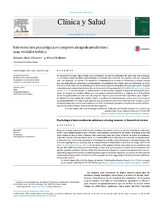Mostrar el registro sencillo del ítem
Intervención psicológica en mujeres drogodependientes:una revisión teórica
| dc.contributor.author | Ruiz Olivares, Rosario | |
| dc.contributor.author | Chulkova, Mina | |
| dc.date.accessioned | 2021-03-18T12:11:54Z | |
| dc.date.available | 2021-03-18T12:11:54Z | |
| dc.date.issued | 2016 | |
| dc.identifier.uri | http://hdl.handle.net/10396/21210 | |
| dc.description.abstract | El consumo de drogas sigue siendo en la actualidad uno de los problemas de salud que más preocupa a la sociedad. Según los datos epidemiológicos estatales más recientes, las mujeres cada vez consumen más. Sin embargo, en cuanto a la asistencia a tratamiento no es tanta la incidencia y cuando asisten hay una dificultad de adherencia al tratamiento y el abandono del mismo suele ser frecuente. Es tal la importancia de cubrir las necesidades particulares de las mujeres drogodependientes, que queda recogido como elemento integral en el último Plan de Acción sobre Drogas español 2013-2016 (Plan Nacional Sobre Drogas, 2013a). En este sentido, a nivel empírico, se han iniciado algunos trabajos de investigación para tratar de indagar las posibles diferencias que puedan presentar hombres y mujeres en el tratamiento de las drogodependencias, así como de proponer algunos para tratamientos específicos para mujeres. El objetivo de este trabajo de revisión teórico es analizar los elementos que caracterizan a las mujeres drogodependientes, establecer qué aspectos hay que tener en cuenta en la intervención con ellas a partir de las investigaciones que se han realizado o se están estudiando y proponer su aplicación a nivel práctico, además de señalar futuras direcciones de investigación. | es_ES |
| dc.description.abstract | Drug use remains today one of the health problems of greatest concern to society. According to the most recent state epidemiological data, women's consumption continuously increases, becoming more and more similar to that of men. However, this same trend does not occur in terms of access to treatment, and when women seek treatment, there is a marked difficulty in adherence to treatment as abandoning it is often the case. Such is the importance of meeting the specific needs of substance-abusing women, that it is even highlighted as a priority and an integral element of the latest Action Plan on Drugs 2013-2016 (Plan Nacional Sobre Drogas, 2013a). In this sense, at the empirical level, researchers have started to study the possible differences men and women may present in drug treatment, as well as the development of a gender-specific treatment. The aim of this theoretical review paper is to analyze the elements that characterize drug dependent women, establishing what aspects should be taken into account in the intervention with women from previous research or from on-going research, suggesting its implementation and future research directions. | es_ES |
| dc.format.mimetype | application/pdf | es_ES |
| dc.language.iso | spa | es_ES |
| dc.publisher | Elsevier | es_ES |
| dc.rights | https://creativecommons.org/licenses/by-nc-nd/4.0/ | es_ES |
| dc.source | Clínica y Salud 27, 1-6 (2016) | es_ES |
| dc.subject | Mujer | es_ES |
| dc.subject | Drogodependencias | es_ES |
| dc.subject | Intervención psicológica | es_ES |
| dc.subject | Women | es_ES |
| dc.subject | Drug abuse | es_ES |
| dc.subject | Psychological intervention | es_ES |
| dc.title | Intervención psicológica en mujeres drogodependientes:una revisión teórica | es_ES |
| dc.title.alternative | Psychological intervention in substance abusing women: A theoretical review | es_ES |
| dc.type | info:eu-repo/semantics/article | es_ES |
| dc.relation.publisherversion | http://dx.doi.org/10.1016/j.clysa.2016.01.001 | es_ES |
| dc.rights.accessRights | info:eu-repo/semantics/openAccess | es_ES |

